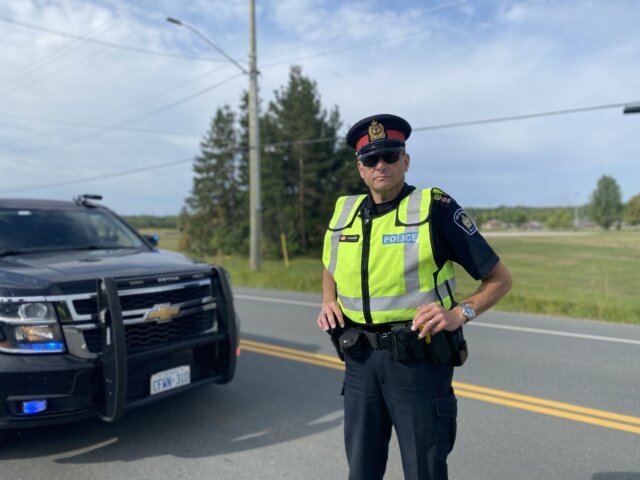Patrol Services
- Home
- Who We Are
- Service Divisions
- Patrol Services
The Patrol Services Unit is the lifeblood of the Sault Ste. Marie Police Service. Not only does it include the most members of our service, those members are also our most visible on a daily basis. There are four divisions under the Patrol Services umbrella. Those divisions include Community Patrol, Community Mobilization, Traffic Services and the Emergency Services Unit, which includes the Canine Unit.
The Sault Ste. Marie Police Service Canine Unit was established in 1998 and currently has one handler and two Police Service Dogs (PSD). Constable Dan Turco currently works with PSD Hektor and PSD Red.
Hektor is a Belgian Malinois. He specializes in suspect apprehension and sniffing out drugs, guns, and other evidence. He can look for missing people, but they must remain on a leash.
Red is a Fox Red Labrador trained in search and rescue. Red wears a GPS collar and can assist in searches off-leash. When he finds a missing person or human remains, he is trained to stay with them and bark to alert his handler.
Police Service Dogs are chosen for their physical ability, strength, and intelligence. A strong temperament is very important as these dogs are often expected to perform in stressful situations. Police Service Dogs are trained in tracking, searching for missing persons, area and building searches, searching for evidence, suspect apprehension and detection of narcotics and firearms. Our Canine Unit is on-call 24 hours a day, seven days a week.
The Canine Unit is part of Patrol Services and works closely with the Emergency Services Unit (ESU) and responds to calls for service similar to uniform patrol officers. In addition, the Canine Unit will assist in as many priority calls as their availability will permit including alarms, serious domestics, suspicious persons, warrant execution, and all instances in which canine support has been requested.
While these are highly-trained and assertive animals, they are able to interact with the public. The Canine Unit attends many public functions and school presentations each year to educate our community on the capabilities and importance of these highly-trained canines.
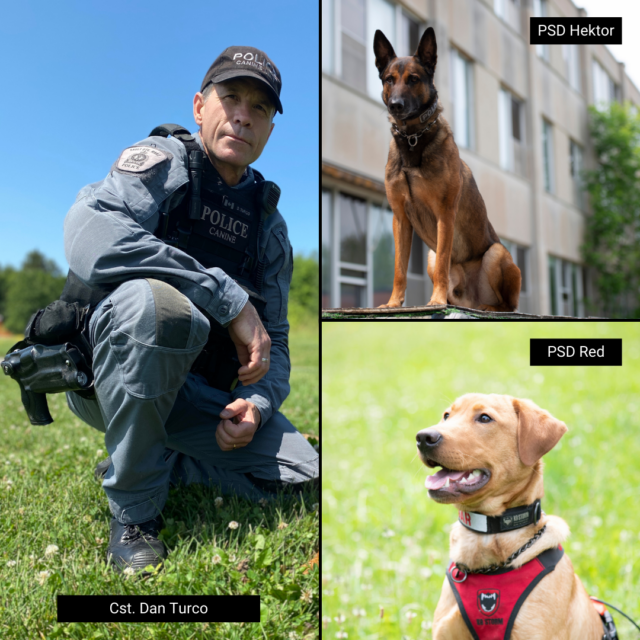
The Central Emergency Reporting Bureau (CERB) is often the first point of contact for members of the community in need of assistance. Our 911 Communicators answer calls for service and dispatch members to support the community.
Civilian members working in CERB are assigned to a platoon and work closely with officers in Patrol Services to serve the community each day.

The Community Mobilization Unit is part of our Patrol Services division. It is comprised of one Sergeant, who supervises the unit, and eight sworn members. Four of the officers make up the Mobile Crisis Rapid Response Team (MCRRT), while the other four are Community Safety Officers. The Community Safety Officers are assigned to our area schools.
Mobile Crisis Rapid Response Team (MCRRT)
The team is a collaborative effort of sworn Officers trained in Mental Health, alongside Sault Area Hospital (SAH) Crisis Services Clinicians (Registered Psychiatric nurses, Social workers). Together we respond to individuals who are suffering from mental illness and/or emotional distress in the community. The goal of the unit is to stabilize the crisis, decrease the frequency of further crisis and prevent future incidents by providing the individual with necessary knowledge, skills, and referrals to partner agencies. If the team determines there are significant concerns for the safety/wellness of an individual, Officers have the ability under Ontario’s Mental Health Act to apprehend the person and transport them to hospital for further psychiatric evaluation. This comprehensive team can provide assessment and effective response within the community. Further follow-up and assessments can be completed by the Transitional Case Manager (TCM). TCM has the ability to bridge pathways to services, assist in diversion from hospital and criminal justice system, create goals, and personalized care planning.
Currently there are seven Crisis Services Clinicians and four officers trained to support the community as part of MCRRT. This unit operates 7 days a week from 12:00 p.m. to 10:00 p.m.
Community Safety Officers
These officers will liaise with members of our community with regards to complaints of disturbances and criminal activity.
The officers will work closely with the Integrated Municipal Enforcement Team (IMET). The team includes enforcement agencies (Police, Fire, City By-law etc.) with the goal of locating neglected properties that are unsafe for tenants and community members and often hot spots for criminal activity and drug use. IMET will be supported by other partner agencies such as the housing commission, social services, Algoma Public Health etc. as needed.
They will have a major role in IMET as they will be assigned to liaise with community members and organizations in our community.
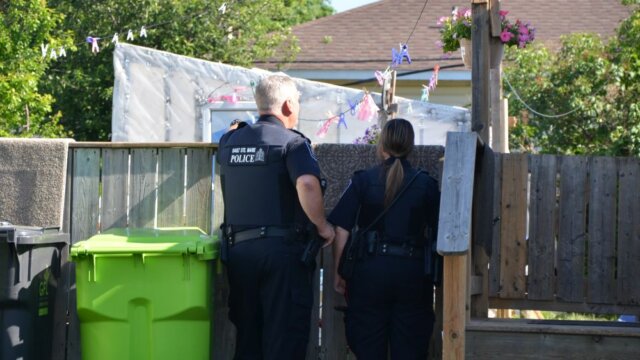
Community Patrol is often the first thing that comes to mind when the topic of policing is discussed. Our cruisers can be seen in and around Sault Ste. Marie and Prince Township on a daily basis.
Community Patrol is comprised of four platoons, each of which includes approximately 15 sworn officers. Each platoon has a Staff Sergeant and at least one Sergeant. The officers in our platoons are often the first people who respond to a large number of our calls for service.
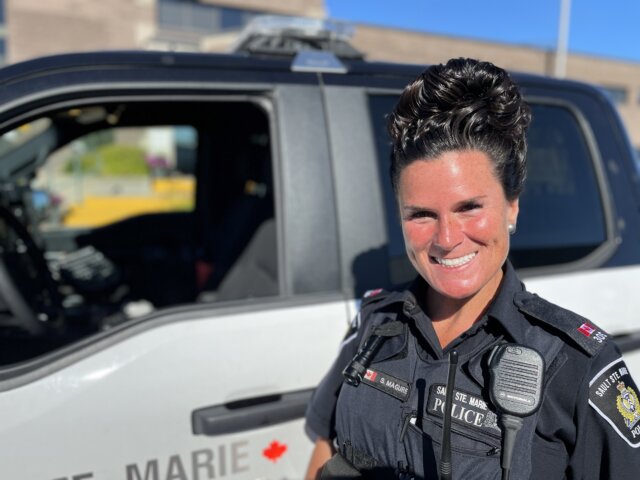
The Emergency Services Unit (ESU) is a specialized police unit formed and trained to handle situations which involve an increased level of violence or risk of violence. Originally formed in 1998, ESU currently has 14 members, including 12 tactical operators, one canine officer and one Sergeant.
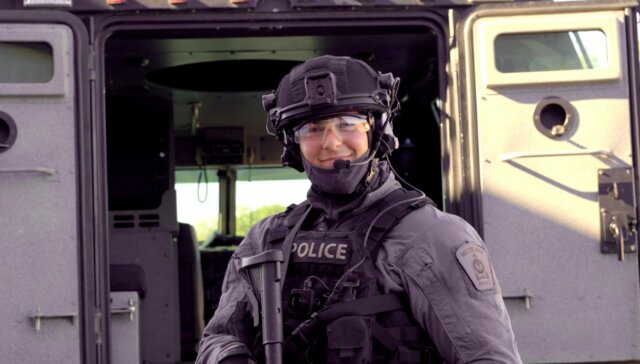
The ESU unit is assigned to Patrol Services and conducts general policing duties when not required for high risk incidents. The mandate of the ESU includes arresting violent and armed suspects, executing search warrants, responding to barricaded persons and hostage situations, high risk security detail, canine support and enhancing the safety of the public and police personnel in the safe resolve of high risk occurrences in the most effective manner possible.
Members of this Unit are highly trained individuals with specialties in a number of areas including containment, de-escalation, explosive disposal, less lethal operations, hostage rescue, and canine support.
The Traffic Unit is comprised of one sergeant and two constables. Traffic officers attend and investigate motor vehicle collisions that are not eligible to be reported to the Collision Reporting Centre. Members of the Traffic unit are qualified as Technical Traffic Collision Investigators (TTCI) and Traffic Collision Reconstruction investigators, having attended training at the Toronto Police College. Officers are trained in the use of a variety of tools to help them complete an investigation including the GPS rover total station, 3D laser scanner and the Crash Data Recorder, to assist in the mapping and investigation of both major injury and fatal collision scenes.
The Traffic Unit also oversees specialized enforcement activities including speed enforcement, seat belt checks and distracted driving.
The Traffic Unit coordinates the RIDE (Reduce Impaired Driving Everywhere) program with officers working extra shifts as a result of funding from the Provincial Government.
Being located in Northern Ontario, a range of transportation methods are needed to provide enforcement in our community. The Traffic Unit utilizes several specialty vehicles to assist with enforcement of both on road and off road activities. Officers operate Police motorcycles, ATV’s and Motorized Snow Vehicles for both emergency response and enforcement of the Highway Traffic Act, The Off Road Vehicles Act and the Motorized Snow Vehicle Act.
